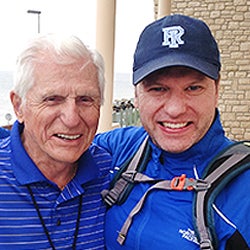Tim Gray picked up a World War II encyclopedia when he was six years old and couldn’t put it down. The battles, the soldiers, the generals—they all intrigued the little boy from Kingston. “It was the most fascinating period in the history of the world,’’ he said. “It was good versus evil. There were amazing stories of courage and sacrifice.’’
Gray went on to graduate from URI with a journalism degree (his mother, brother, and wife are also URI graduates; his daughter attends URI; and his father worked here for nearly 30 years in various roles, including as assistant provost for Marine Affairs). For years, Gray worked as a sportscaster, including at Channel 10 in Providence, but his passion for WWII remained. One day, he had a big idea: quit the day job and listen to veterans tell war stories as the camera rolled.
That “aha’’ moment gave birth to Gray’s nonprofit, The World War II Foundation, which is dedicated to telling stories and making documentary films about World War II veterans and survivors. Gray takes veterans, many of whom are in their 90s, to the battlefields where they fought in Europe and the Pacific. For most, it’s the first time back. “They cry and wonder why they survived and the guy next to them did not.’’
Since taking that big risk leaving TV sports in 2004, Gray has produced 11 award-winning films, which are donated to PBS stations and shown worldwide. Once, he was wearing a URI baseball hat while filming in Normandy and a veteran approached him: Are you a URI grad? asked 94-year-old Steve Melnikoff of Cockeysville, Md. Turns out Melnikoff was too—class of ’51.
Of the 16 million veterans who fought in WWII, only 1.2 million are left. Gray’s goal is to reach as many as he can before it’s too late. “They saved the world,’’ he says. “They made America what it is today.’’
Gray’s message is resonating throughout the country. Patriots coach Bill Belichick, former Red Sox pitcher Curt Schilling, and actor Tom Hanks are among the heavy hitters who have contributed to the cause. Giving to his nonprofit, Gray says, is a way of saying thanks for our freedom.

